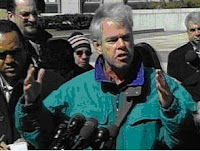 can you do? The President already committed himself, remember?
can you do? The President already committed himself, remember?"I am troubled by the initial news stories," Bush said. "I'm mindful that there's a thorough investigation going on. If in fact, laws were broken, there will be punishment."- Oh, wait, that was when he was talking about the Marines in Haditha.
What Bush said was "anyone involved in leaking the name of the covert CIA operative would be fired." This was tough talk, coming from the swaggering Texan.
But, when it seemed to look like maybe the leaker was Rove, Cheney, as well as Libby, but only Libby got indicted, Bush back pedaled, "If somebody committed a crime, they will no longer work in my administration."
Well, it seems unlikely the legal system will vindicate Libby. He really has no trial errors which will get him a new trial or an appellate reversal. The only errors in his trial were tactical.
Scooter Libby may well have had an excellent legal team; in fact, the “best that money can buy”. However, they botched his defense in a fundamental way. The defense relied on two paths to not guilty, and both required Mr. Libby to testify in his own defense.
The defense walked first path in the aggressive opening statement. The defense theory: Libby took the fall for more powerful figures in the Administration. "They're trying to set me up. They want me to be the sacrificial lamb," Libby’s attorney Theodore Wells said, recalling Libby's end of the conversation. "I will not be sacrificed so Karl Rove can be protected." According to Wells, the confidential conversations Libby had with several well-known journalists were not intended to spread the identity of Valerie Plame, the covert CIA officer. Instead, Libby's attorney said, he was acting at Cheney's instructions to respond to allegations that the vice president withheld information that would have raised doubts about whether Iraq was trying to develop weapons of mass destruction. Libby, Wells said, told Cheney he feared "people in the White House are trying to set me up." Wells then showed the jury the text of a note Cheney had jotted that said: "Not going to protect one staffer + sacrifice the guy that was asked to stick his neck in the meat grinder because of the incompetence of others." Defense Portrays Libby as Scapegoat Jury Is Told About White House Rifts By Amy Goldstein and Carol D. Leonnig, Washington Post Staff Writers, Wednesday, January 24, 2007; A01
After abandoning any effort to prove this, the defense resorted to jury nullification. Jury nullification reflects a jury's absolute right, as the finder of fact, to render a verdict of "not guilty," even though they believe the State has proved the elements of the crime “beyond a reasonable doubt.” As the United States Supreme Court has observed, “The jury could not function as circuitbreaker in the State's machinery of justice if it were relegated to making a determination that the defendant at some point did something wrong, a mere preliminary to a judicial inquisition into the facts of the crime the State actually seeks to punish. United States v. Apprendi, 542 U.S. 296, 307 (2000). Although courts generally bar defense lawyers from directly asking the jury for nullification, a good lawyer will do that every time.
As his final dramatic flair in closing argument, Wells trotted out nullification one last time: “He's been under my protection for the last month. Just give him back." Wells' voice cracked and he spoke his final words through sobs. "Give him back to me! Give him back!" He rushed back to his chair at the head of the defense table, covered his face and then stared at the floor. Libby's last disinformation campaign. By Sidney Blumenthal.
The problem with both trial tactics lies in the singular prerequisite that the defendant testify. A jury really wants to hear the defendant say I didn’t do it, and if I did it, I’m really sorry, and if I am not sorry it was no big deal anyway.
The defense prepared the jury for a counter-attack by painting Libby as the fall guy. They took up the gauntlet of presenting a defense instead of relying on the defense of Not Guilty. The rational jury then expects to hear some evidence in the defendant’s case-in-chief establishing the facts of the defense. In the juror’s mind the defense moved from the position of “has the state proved the case beyond a reasonable doubt” to the mind, “Which side proved their case to me?” In Libby’s cause this burden shift produced a crucial error.
Furthermore, if you want the jury to nullify the verdict in the face of the evidence, you must give them more than a cross-examination about “faulty memory” to do that. As the juror who spoke out observed, “I will say there was a tremendous amount of sympathy for Mr. Libby on the jury,” said the juror, Denis Collins,  a former newspaper reporter. “It was said a number of times: ‘What are we doing with this guy here? Where’s Rove? Where are these other guys?’ ” ‘Where’s Rove? Where are these other guys?’ Juror says Libby was guilty but was set up to take the fall in Plame probe By Alex Johnson Reporter MSNBC Updated: 8:50 p.m. CT March 6, 2007.
a former newspaper reporter. “It was said a number of times: ‘What are we doing with this guy here? Where’s Rove? Where are these other guys?’ ” ‘Where’s Rove? Where are these other guys?’ Juror says Libby was guilty but was set up to take the fall in Plame probe By Alex Johnson Reporter MSNBC Updated: 8:50 p.m. CT March 6, 2007.












